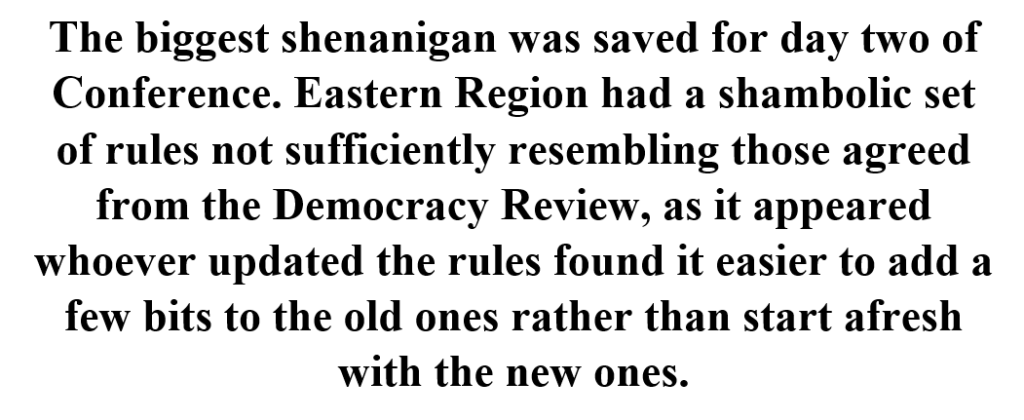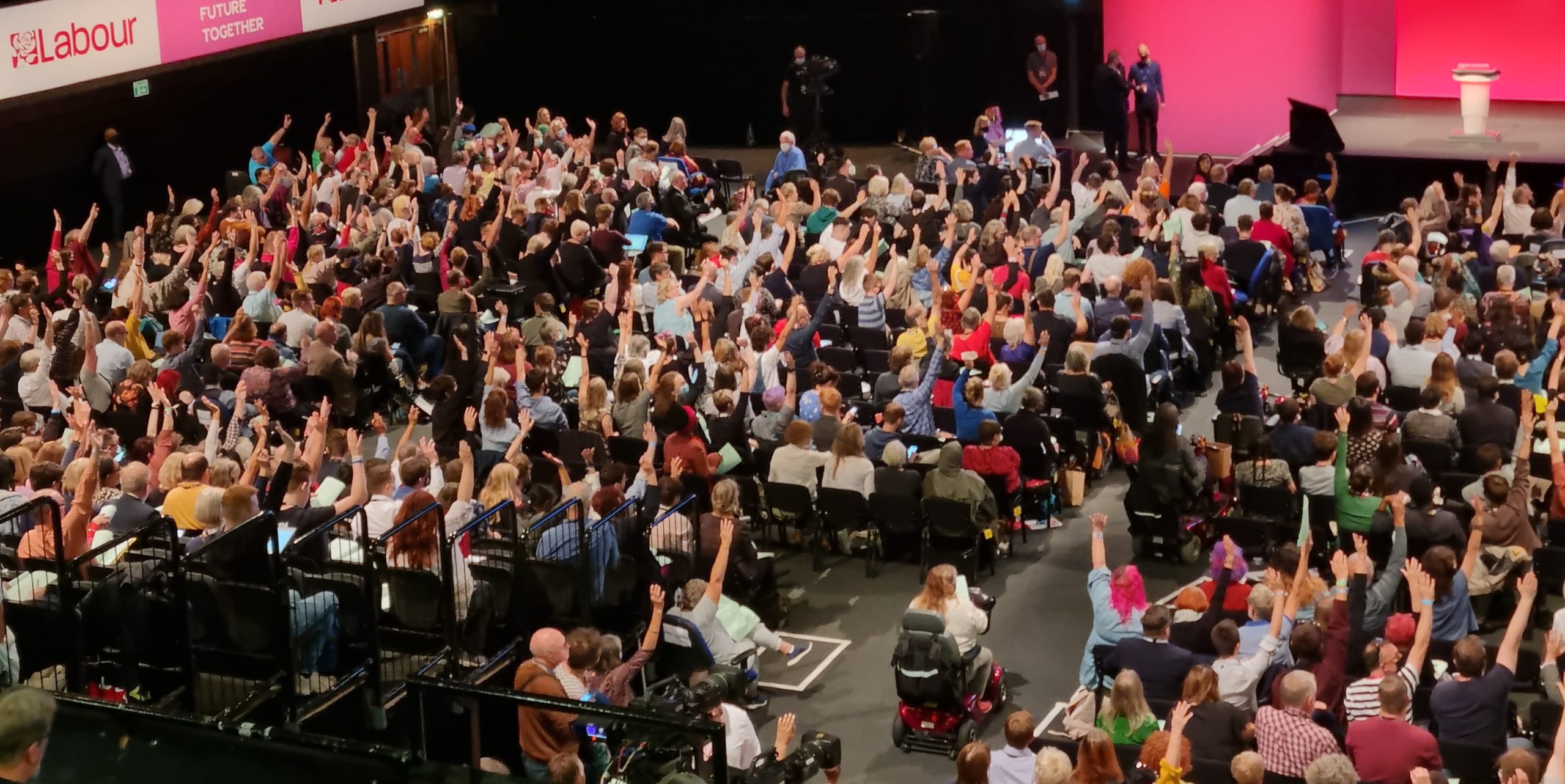By Rachel Garnham
The Eastern Region Labour Party Conference earlier in November followed a pattern familiar to those who have followed the London Region Conference and Annual Conference. The left is down but by no means out and remains undeterred in fighting for a Labour Party that will fight the Tories and has the policies and engaged membership that can help win elections.
This is despite a whole heap of shenanigans designed to exclude left candidates and delegations, compounded by an unravelling mystery about where the rules being used might have come from and whether they had any validity at all.
Thanks to Zoom facilitating the instigation and growth of Eastern Labour Left, the left was more organised and coordinated than it has been in decades in our region and fielded a strong slate for the Regional Executive Committee (REC), gaining nominations early on. Sadly but not unexpectedly, this met a series of obstacles, not least a two week extension to the original deadline which appeared to be designed for the right to get their act together.
Disciplinary action launched against candidates
We saw similar spurious disciplinary action launched against candidates and delegates as we saw in advance of Annual Conference and have sadly come to expect – it appears the Labour right are, unsurprisingly, never confident of winning in a fair fight.
One candidate was elected as a delegate by his CLP meeting but it was later ruled that, because he had not submitted his nomination in the 24 hour window set by his CLP secretary over a previous weekend when he was away, the decision of the meeting to select him as delegate was not admissible.
Luton CLPs – the two biggest left CLPs in the Region – were unfairly excluded from any representation because of an influx of new members causing concern. This was despite the election of delegates taking place at General Committees pre-dating the issues concerned, and other issues discussed at the same meetings deemed valid. Along with Peterborough CLP being unrepresented, and the impact of exclusions on the BAME Chair candidate, the proceedings certainly brought to mind institutional racism. Furthermore, the election of Bedfordshire reps to the REC, excluding half the Bedfordshire membership, cannot possibly be valid.
A number of left candidates fell foul of a stated ‘rule’ – later found to have apparently been removed by the NEC back in March – that to be validly nominated you had to be both elected as a delegate and nominated by your CLP. Left candidates who were delegates but had nominations from elsewhere were ruled out – no such issues were met by the so-called ‘Labour to Win’ candidates who appeared out of nowhere with apparently no need to have been elected democratically as delegates or validly nominated.
Many rural, all-member structures
CLPs were challenged on being quorate, with nominations ruled out or re-run meetings imposed, until it was noted that CLPs are allowed to complete urgent business such as meeting conference deadlines; and most likely a realisation that if you wait for Eastern Region CLPs – many rural, all-member structures with few Labour elected representatives – to have quorate meetings under the high quoracy figure in the rulebook, there may not be much of a conference at all.

Some CLPs were advised that delegate nominations agreed at their AGMs were invalid as they were in advance of the notice being sent out – despite this being common custom and practice for electing delegates – in some cases not causing any issues dating back to the 1970s!
As usual, left delegates found their delegate forms were not submitted by not-so -left CLP secretaries, despite endless chasing, and they were therefore disenfranchised.
Despite all this, the left secured a reasonable showing with the Chair’s vote showing 40 per cent for the left against the incumbent’s 60 per cent. Unfortunately, this balance meant no left slate candidates were elected but some soft left candidates were elected unopposed in spots left clear for them and we have some solid left trade union representation.
Difficult to motivate the left
As well as navigating the hurdles presented by the process, it was also undoubtedly difficult to motivate the left around a Conference platforming Wes Streeting, Bridget Phillipson, Vernon Coaker and Alison McGovern to elect a Committee that is largely ignored anyway. In this context, 40 per cent is quite impressive!
On policy, as with London and Annual Conference, it was a different picture. Numerous CLP motions were ruled out, it seems, but some decent policy against Fire and Rehire and supporting unions in struggle was passed from Unite. My own CLP’s motion on the terrible impact of Covid, noting that “Labour has too often supported the government” and calling for a comprehensive elimination and suppression strategy, was passed unanimously. Again, like Annual Conference, relations between left unions and CLPs were a huge strength in pushing for left policy and left candidates in elections, and this must be maintained.
Adding new rules to old ones
The biggest shenanigan was saved for day two of Conference. Eastern Region had a shambolic set of rules not sufficiently resembling those agreed from the Democracy Review, as it appeared whoever updated the rules found it easier to add a few bits to the old ones rather than start afresh with the new ones. These were used to run our 2019 conference (rescheduled for early 2020).
I raised this several times at the NEC in 2020 but it seems they were finally discussed properly in March 2021 and amendments made. Previous rules contained a clause that “b) At least 1 officer position shall be from an affiliated organisation and one from the CLP section”. On Sunday we were therefore expecting to elect a Chair or Vice Chair representing CLPs.
So when there were no candidates representing CLPs, I raised a question under the Conference Arrangements Committee report. The Regional Director was not able to give a satisfactory answer and a helpful suggestion from trade union delegates that the election should be delayed until the rules could be checked was rejected.
It later emerged that the new set of rules had been circulated to REC members a few days before the meeting but as they were unflagged in the email, it appeared that many members had not noticed the change, let alone discussed it. Follow-up investigations revealed that the NEC had made changes to the rules in March – including reportedly removing the requirement to be a delegate from your own organisation and have their nomination, the ruling that led to the exclusion of at least four left candidates.
Members should seek clarity in advance
Yet still no-one can pinpoint where the removal of the CLP Chair came from and the rules circulated to the REC do not appear to reflect the decisions made at the March NEC. Investigations continue, and members are well-advised to seek clarity in advance of their regional conferences about what set of rules they are working to and whether and where they have been signed off!
The officer election resulted in a Chair from the GMB and Vice Chairs, one from the Association of Labour Councillors and one from the GMB, with the Unison candidate defeated for Vice Chair – hardly a good reflection of the region’s diversity or healthy for union relations with one union taking two out of three officer spots.
So rumours of left demise in Labour’s Eastern Region are much over-stated. Against a machine seemingly focused on left exclusion, and making up the rules as they went along, we remain united, and with the policies and organisation ready to fight another day.
Rachel Garnham was a Labour NEC member from 2018 to 2020. She is Vice Chair of the Campaign for Labour Party Democracy and a member of Eastern Labour Left organising group.
This report is republished from Labour Hub. The original can be found here.



